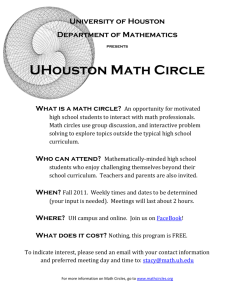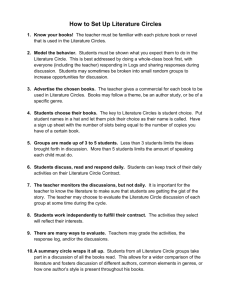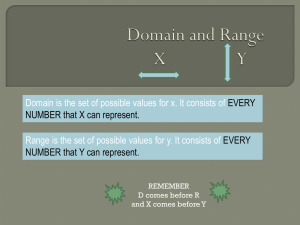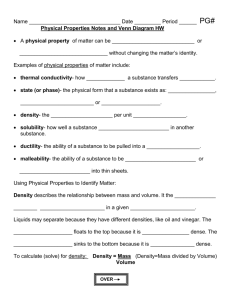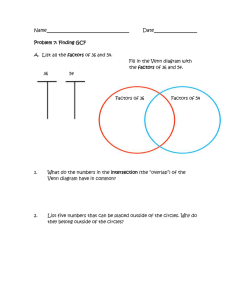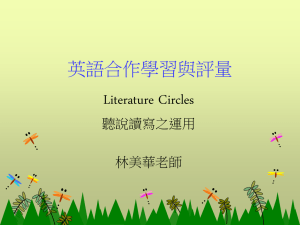bar graph
advertisement
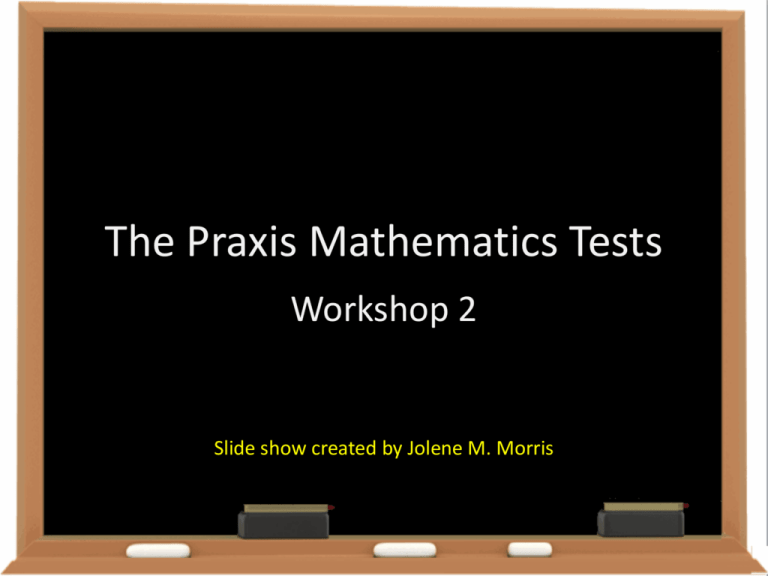
The Praxis Mathematics Tests Workshop 2 Slide show created by Jolene M. Morris ETS Praxis Website Official website where you can find more information about the Praxis tests www.ets.org/praxis/ NCTM Website The National Council of Teachers of Mathematics (NCTM) is the national organization that sets the standards for what mathematics concepts should be taught and at what grade levels. www.nctm.org Jolene’s Website Jolene’s website where you can find Praxis resources such as Jolene’s 400 Praxis flashcards in a format to import into an app such as Flashcards To Go or Anki or Quizlet www.JoleneMorris.com Charts & Graphs (see study packet) • • • • • • • • Bar (broken scale) Histogram Line Circle or Pie Pictograph Table Scatterplot • • • • • Venn Diagram Stem & Leaf Plot Box & Whiskers Plot Logic Diagram Flow Chart Bar Graph A bar graph is used to demonstrate relative values in a data set. The primary purpose of a bar graph is to compare values: The height (or length) of the bars shows how the values compare to other values in the data set. Histogram A histogram is a bar graph where the bars are vertical; the bars represent continuous groups of numerical data; and the bars touch. The term comes from the late 1890’s meaning an historical diagram. Line Graph A line graph is a statistical graph showing the data points connected by line segments. A line graph is used to visualize trends in the data. Circle or Pie Chart A circle graph (also known as a pie chart) is a circular graph where sections of the circle represent parts of the whole. A pie chart ALWAYS gives parts of a whole. The pie sections are usually labeled with percentages. Pictograph A pictograph is a graph or chart where pictures are used to indicate a specific number of objects. Table A table is used to display the information in an organized manner. A table usually has column headings -- each record is in a row of the data table. wwwneic.cr.usgs.gov/neis/general/handouts/mag_vs_int.html Gauges, Rulers, & Dials Scatterplot A scatter plot is a graph showing a collection of twocoordinate points. The points are not connected with line segments, but the points may demonstrate a trend. A technique called the “line of best fit” determines a line through the points where about half of the points are above the line and about half the points are below the line. This line of best fit visually demonstrates a trend. Venn Diagram A Venn diagram is a diagram using circles to show logic statements. Most Venn diagrams display overlapping circles. Venn diagrams are named after John Venn who developed the concept of Venn diagrams about 1880. By shading portions of the overlapping circles, set theory concepts such as UNION and INTERSECTION can be shown. Stem & Leaf The stem & leaf plot is a table used to show all data values, but in an organized manner. The table has two columns. The right column gives the ones place and the left column displays the tens place values: tens ones 0 1588 1 36667 2 3 125 The stem & leaf plot above displays the numbers 1, 5, 8, 8, 13, 16, 16, 16, 17, 31, 32, and 35. Box & Whiskers A box and whiskers plot is a visual way to show the five statistical number summaries: Minimum, Q1, Q2, Q3, and Maximum Logic A logic diagram is a visual way to determine the truth or logic of statements. A truth table may also be used. With a logic diagram, use circles to show relationships. For example: (1) ALL cats have tails. (2) SOME cats are black. (3) Goldy is a cat. ALL means the circle is completely inside another circle. SOME means the circle is partially inside another circle. NONE means the circles are completely separate. From the logic diagram, we see that Goldy definitely has a tail but may or may not be black. Flow Chart A flow chart is a diagram used to visually describe an algorithm. A flow chart shows a step-by-step path for the algorithm. Small circles are used to show the start and end points. Diamonds are used for decisions -- to ask questions and branch the flow chart depending on the answer to the question. A rectangle is used to show a process or action step. Input and output are represented by parallelograms. Other symbols are used in more complex flow charts. Graphs & Charts ANY QUESTIONS?
